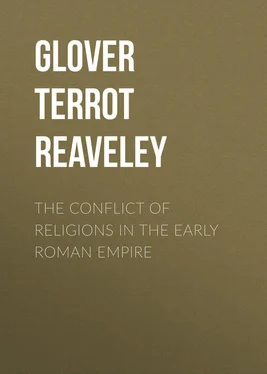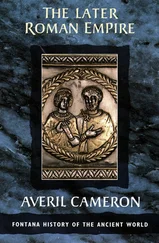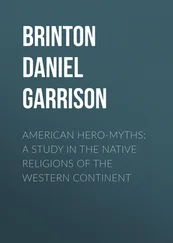Terrot Glover - The Conflict of Religions in the Early Roman Empire
Здесь есть возможность читать онлайн «Terrot Glover - The Conflict of Religions in the Early Roman Empire» — ознакомительный отрывок электронной книги совершенно бесплатно, а после прочтения отрывка купить полную версию. В некоторых случаях можно слушать аудио, скачать через торрент в формате fb2 и присутствует краткое содержание. Жанр: foreign_religion, foreign_antique, foreign_prose, на английском языке. Описание произведения, (предисловие) а так же отзывы посетителей доступны на портале библиотеки ЛибКат.
- Название:The Conflict of Religions in the Early Roman Empire
- Автор:
- Жанр:
- Год:неизвестен
- ISBN:нет данных
- Рейтинг книги:4 / 5. Голосов: 1
-
Избранное:Добавить в избранное
- Отзывы:
-
Ваша оценка:
- 80
- 1
- 2
- 3
- 4
- 5
The Conflict of Religions in the Early Roman Empire: краткое содержание, описание и аннотация
Предлагаем к чтению аннотацию, описание, краткое содержание или предисловие (зависит от того, что написал сам автор книги «The Conflict of Religions in the Early Roman Empire»). Если вы не нашли необходимую информацию о книге — напишите в комментариях, мы постараемся отыскать её.
The Conflict of Religions in the Early Roman Empire — читать онлайн ознакомительный отрывок
Ниже представлен текст книги, разбитый по страницам. Система сохранения места последней прочитанной страницы, позволяет с удобством читать онлайн бесплатно книгу «The Conflict of Religions in the Early Roman Empire», без необходимости каждый раз заново искать на чём Вы остановились. Поставьте закладку, и сможете в любой момент перейти на страницу, на которой закончили чтение.
Интервал:
Закладка:
The childhood of a pagan
But the jest of Fuscus was the earnest of many. If men were conscious of decay in the sanction which religion had once given to morality, there was still a great deal of vague religious feeling among the uneducated and partially educated classes. Again and again we read complaints of the folly of grandmothers and nurses, and it was from them that the first impressions of childhood came. Four centuries later than the period now under discussion it was still the same. "When once vain superstition obsessed the heathen hearts of our fathers, unchecked was its course through a thousand generations. The tender hope of the house shuddered, and worshipped whatever venerable thing his hoary grandsires showed him. Infancy drank in error with its mother's milk. Amid his cries the sacred meal was put between the baby's lips. He saw the wax dripping upon the stones, the black Lares trickling with unguent. A little child he saw the image of Fortune with her horn of wealth, and the sacred stone that stood by the house, and his mother pale at her prayers before it. Soon himself too, raised high on his nurse's shoulders, he pressed his lips to the stone, poured forth his childish prayers, and asked riches for himself from the blind rock, and was sure that, whatever one wished, that was where to ask. Never did he lift his eyes and his mind to turn to the citadel of reason, but he believed, and held to the foolish custom, honouring with blood of lambs the gods of his family. And then when he went forth from his home, how he marvelled at the public festivals, the holy days and the games, and gazed at the towering Capitol, and saw the laurelled servants of the gods at the temples while the Sacred Way echoed to the lowing of the victims." So wrote Prudentius.[ 28 28 Prudentius, contra Symmachum , i, 197-218.
] So too wrote Tibullus – "Keep me, Lares of my fathers; for ye bred me to manhood when a tender child I played at your feet."[ 29 29 Tibullus, i, 10, 15.
]
How crowded the whole of life was with cult and ritual and usage, how full of divinities, petty, pleasing or terrible, but generally vague and ill-defined, no one will readily realize without special study, but some idea of the complexity of the Roman's divine environment can be gained from even a cursory survey of Ovid's Fasti , for example, or Tertullian's Apology , or some of the chapters of the fourth book of Augustine's City of God . "When," asks Augustine, "can I ever mention in one passage of this book all the names of gods and goddesses, which they have scarcely been able to compass in great volumes, seeing that they allot to every individual thing the special function of some divinity?" He names a few of the gods of agriculture – Segetia, Tutilina, Proserpina, Nodutus, Volutina, Patelana, Lacturnus, Matuta, etc. "I do not mention all."[ 30 30 C.D. iv, 8. "To an early Greek," says Mr Gilbert Murray, "the earth, water and air were full of living eyes: of theoi , of daimones , of Kêres . One early poet says emphatically that the air is so crowded full of them that there is no room to put in the spike of an ear of corn without touching one." — Rise of Greek Epic , p. 82.
] "Satan and his angels have filled the whole world," said Tertullian.[ 31 31 de Spect. 5; cf. de Idol. 16; de cor. mil. 13, gods of the door; de Anima , 39, goddesses of child-birth.
]
Fauns, trees, and wells
Gods of this type naturally make little figure in literature though Proserpina, in consequence of her identification with the Greek Persephone, achieved a great place and is indeed the subject of the last great poem written under the Roman Empire. But there were other gods of countryside and woodland, whom we know better in art and poetry. "Faunus lover of fugitive Nymphs" is charming enough in Horace's ode, and Fauns, Pans and Satyrs lend themselves readily to grotesque treatment in statue and gem and picture. But the country people took them seriously. Lucretius, speaking of echoes among the hills, says: – "These spots the people round about fancy that goat-footed Satyrs and nymphs inhabit; they say that they are the Fauns, whose noise and sportive play breaks the still silence of the night as they move from place to place… They tell us that the country people far and wide full oft hear Pan, when, nodding the pine-cap on his half-bestial head, he runs over the gaping reeds with curved lip… And of other like monsters and marvels they tell us, that they may not be thought to inhabit lonely places, abandoned even by the gods."[ 32 32 Lucr. iv, 580 f. Virg. Æn. viii, 314.
] Cicero makes his Stoic say their voices are often to be heard.[ 33 33 Cic. N.D. ii, 2, 6: cf. De Div. i, 45, 101. Warde Fowler, Roman Festivals , pp. 256 ff. on the Fauni.
] Pliny, in his Natural History , says that certain dogs can actually see Fauns; he quotes a prescription, concocted of a dragon's tongue, eyes and gall, which the Magi recommend for those who are "harassed by gods of the night and by Fauns";[ 34 34 Pliny, N.H. viii, 151; xxx, 84.
] for they did not confine themselves to running after nymphs, but would chase human women in the dark.
Plutarch has a story of King Numa drugging a spring from which "two dæmons, Picus and Faunus," drank – "creatures who must be compared to Satyrs or Pans in some respects and in others to the Idæan Dactyli," beings of great miraculous power.[ 35 35 Plutarch, Numa , 15; de facie in orbe lunæ , 30; Ovid, Fasti , iii, 291.
] A countryside haunted by inhabitants of more or less than human nature, part beasts and part fairies or devils, is one thing to an unbeliever who is interested in art or folk-lore, but quite another thing to the uneducated man or woman who has heard their mysterious voices in the night solitude and has suffered in crop, or house, or herd from their ill-will.[ 36 36 Horace's ode attests the power of the Fauns over crops and herds.
] What the Greek called "Panic" fears were attributed in Italy to Fauns.[ 37 37 Dionys. Hal. v, 16.
]
"Trees," says Pliny, "were temples of divinities, and in the old way the simple country folk to this day dedicate any remarkable tree to a god. Nor have we more worship for images glittering with gold and ivory than for groves and the very silence that is in them."[ 38 38 Pliny, N.H. xii, 3.
] The country people hung rags and other offerings on holy trees – the hedge round the sacred grove at Aricia is specially mentioned by Ovid as thus honoured.[ 39 39 Ovid, Fasti , iii, 267. Licia dependent longas velantia sæpes, et posita est meritæ multa tabella deæ .
] The river-god of the Tiber had his sacred oak hung with spoils of fallen foes.[ 40 40 Virgil, Æn. x, 423.
]
Holy wells too were common, which were honoured with models of the limbs their waters healed, and other curious gifts, thrown into them – as they are still in every part of the Old World. Horace's fount of Bandusia is the most famous of these in literature.[ 41 41 Horace, Odes , iii, 13.
] It was an old usage to throw garlands into springs and to crown wells on October 13th.[ 42 42 W. Warde Fowler, Roman Festivals , p. 240.
] Streams and wells alike were haunted by mysterious powers, too often malevolent.[ 43 43 Cf. Tertullian, de Baptismo , 5. Annon et alias sine ullo Sacramento immundi spiritus aquis incubant, adfectantes illam in primordio divini spiritus gestationem? Sciunt opaci quique fontes, et avii quique rivi, et in balneis piscinæ et euripi in domibus, vel cisternæ et putei, qui rapere dicuntur, scilicet per vim spiritus nocentis. Nympholeptos et lymphaticos et hydrophobos vocant quos aquæ necaverunt aut amentia vel formidine exercuerunt. Quorsum ista retulimus? Ne quis durius credat angelum dei sanctum aquis in salutem hominis temperandis adesse.
]
Интервал:
Закладка:
Похожие книги на «The Conflict of Religions in the Early Roman Empire»
Представляем Вашему вниманию похожие книги на «The Conflict of Religions in the Early Roman Empire» списком для выбора. Мы отобрали схожую по названию и смыслу литературу в надежде предоставить читателям больше вариантов отыскать новые, интересные, ещё непрочитанные произведения.
Обсуждение, отзывы о книге «The Conflict of Religions in the Early Roman Empire» и просто собственные мнения читателей. Оставьте ваши комментарии, напишите, что Вы думаете о произведении, его смысле или главных героях. Укажите что конкретно понравилось, а что нет, и почему Вы так считаете.












